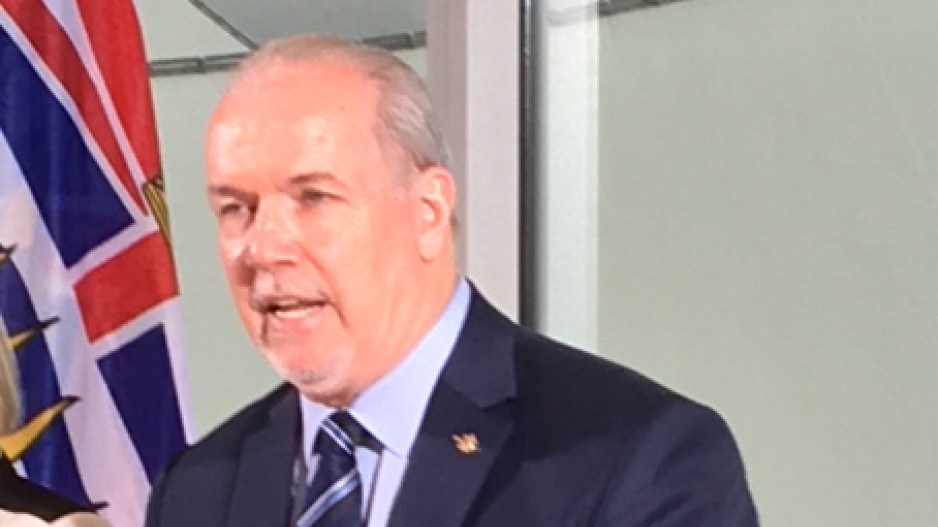Premier John Horgan reiterated his support for a liquefied natural gas industry February 2 in a debriefing, following his recent trade trip to Asia, but it was trade relations with B.C.'s next-door neighbour, Alberta, that generated the most questions from reporters.
Horgan and three of his cabinet ministers travelled through China, Japan and South Korea January 20 to 30 to drum up trade with B.C.
While there, Horgan and other B.C. delegates promoted everything from horseback riding tours in the Cariboo to Vancouver’s expertise in hydrogen fuel cells quantum computing.
It was Horgan’s first trip to Asia, and the premier said he was “staggered” by just how bad China’s air quality was – providing a segue to talk about the opportunities he saw there to sell China LNG.
“The opportunity for British Columbia to be part of the solution, to not just air quality, but the deep commitment that we heard from government officials, as well as industry leaders, to meet their climate change objectives, was quite powerful for me on a personal level,” Horgan said.
“We talked about various opportunities with the various joint venture partners of LNG Canada, which I committed to do before I left,” Horgan said. “And the opportunities are enormous.”
While in Japan, Horgan also visited the terminal that will receive propane from a new $500 million propane export terminal being built in Prince Rupert by AltaGas (TSX:ALA).
While Horgan has taken pains to demonstrate his commitment to one fossil fuel – natural gas – his government’s new restrictions on oil from Alberta, which has so angered Albertans that they are now talking about boycotting B.C. products and tourism, generated the most questions from reporters.
Alberta Premier Rachel Notley has already cancelled talks between B.C. and Alberta over beefing up transmission lines to allow B.C. to sell Alberta power – a move Notley said will cost B.C. $500 million a year.
That was just the first shot across the bow, and Notley has suggested more legal and economic sanctions are forthcoming.
Meanwhile, the hashtag #BoycottBC is now trending on Twitter, one Alberta restaurant has reportedly announced it is pulling B.C. wines off its menu, and a number of Albertans have said they cancelling vacation plans to B.C.
Horgan was asked to defend courting trade with China while alienating B.C.’s biggest interprovincial trading partner – Alberta – by trying to block its oil from getting to foreign markets, including China, and potentially killing thousands of construction jobs in B.C.
“I believe that my responsibility is to protect the interest of British Columbians and that’s what I intended to do,” Horgan said. “There was no attempt to be provocative, and I’ll leave it to others to do that.”
While in Asia, Horgan visited demonstration projects that use B.C wood. He reiterated the important of cultivating new markets for B.C. forest products, in light of softwood lumber duties and the real threat of the North American Free Trade Agreement being cancelled by the U.S.
“If we allow trade disputes with the U.S. to have an impact on the forest dependent communities and the people who live there, we will have failed British Columbians, and that’s why it was so critical that we talk about wood products as well,” Horgan said.
Horgan said there are also big opportunities in Asia for B.C.’s high-tech and clean-tech sectors. He noted recent acquisitions of Vancouver high-tech companies by Asian companies, and Bruce Ralston, minister of Jobs, Trade and Technology, talked about the opportunities for clean-tech companies like Ballard Power Systems (TSX:BLD) in China. He also noted the recent $45 million series B raise, lead by Japan’s Fujitsu Ltd., by Vancouver quantum computing software company, 1QBit.
“Investment interest in our sector, particularly our gaming sector, is significant,” Horgan said.
Horgan also said there is particularly a high demand for B.C. seafood and other food products. He said an arrangement with South Korea’s Coupang, which Horgan described as Korea’s Amazon, will give a platform for 100 products from B.C.
Exports to China totaled $5.9 billion in 2016, making China B.C.'s second largest export market.




